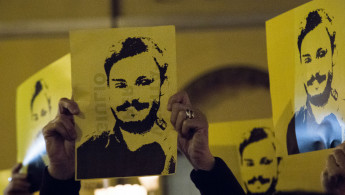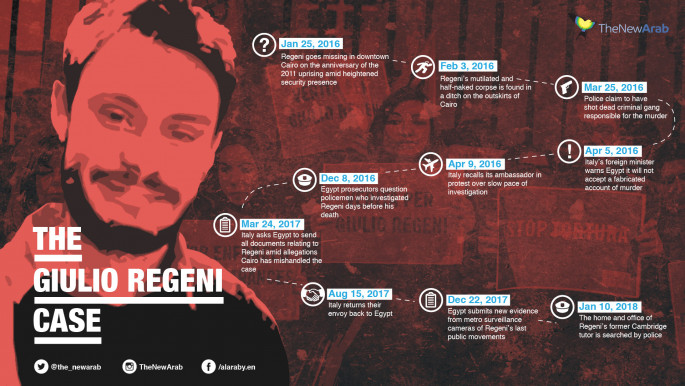Egypt to share video footage with Italian experts in Regeni murder probe
A team of Italian experts will travel to Cairo next week to take part in the retrieval of CCTV recordings as part of the investigation into the 2016 killing of Italian student Giulio Regeni.
Egyptian prosecutor Nabil Sadek said on Monday that he had invited Rome's chief prosecutor Giuseppe Pignatone to send a delegation to attend the retrieval of the Cairo metro CCTV recordings on 15 May.
Egypt has agreed to give the Italian delegation a copy of the CCTV recordings, Sadek said.
"The Rome chief prosecutor has decided to send a delegation headed by his assistant, Sergio Colaiocco, and comprising Italian technical experts to attend the retrieval process, on which both sides pin high hopes to reach the truth about the incident and to uncover its perpetrators," the Egyptian prosecutor's statement said.
"They agreed that the Rome prosecution will obtain a copy of what is retrieved at the end of the process."
In January, Egyptian authorities submitted new evidence to the investigation, constituting recordings from metro stations in Cairo.
It is understood that Regeni was arrested while taking the Cairo metro on 25 January 2016, the fifth anniversary of the 2011 revolution.
Egyptian security is known to have been bolstered on this occasion for fear of the slightest unrest or repeat protests.
Regeni, a PhD student, went missing in the Egyptian capital on 25 January 2015. His body bore torture marks synonymous with practices employed by the Egyptian secret police, who are known to surveil and kidnap dissidents and political opponents, including students.
He had been doing postgraduate research not Egyptian trade unions.
Since the beginning of the investigation, Egypt has faced accusations that a member of its security services committed the murder, but Cairo has denied these claims.
The Regeni family's legal advisor, Ibrahim Metwally, was arrested and detained for 15 days by Egyptian authorities in September, adding fuel to the raging furore over their handling of the investigation, as well as their shoddy human rights record amid the post-Arab spring crackdown on dissent and freedoms.






 Follow the Middle East's top stories in English at The New Arab on Google News
Follow the Middle East's top stories in English at The New Arab on Google News
![The UAE is widely suspected of arming the RSF militia [Getty]](/sites/default/files/styles/image_330x185/public/2024-11/GettyImages-472529908.jpg?h=69f2b9d0&itok=Yauw3YTG)
![Netanyahu furiously denounced the ICC [Getty]](/sites/default/files/styles/image_330x185/public/2024-11/GettyImages-2169352575.jpg?h=199d8c1f&itok=-vRiruf5)
![Both Hamas and the Palestinian Authority welcomed the ICC arrest warrants [Getty]](/sites/default/files/styles/image_330x185/public/2024-11/GettyImages-2178351173.jpg?h=199d8c1f&itok=TV858iVg)